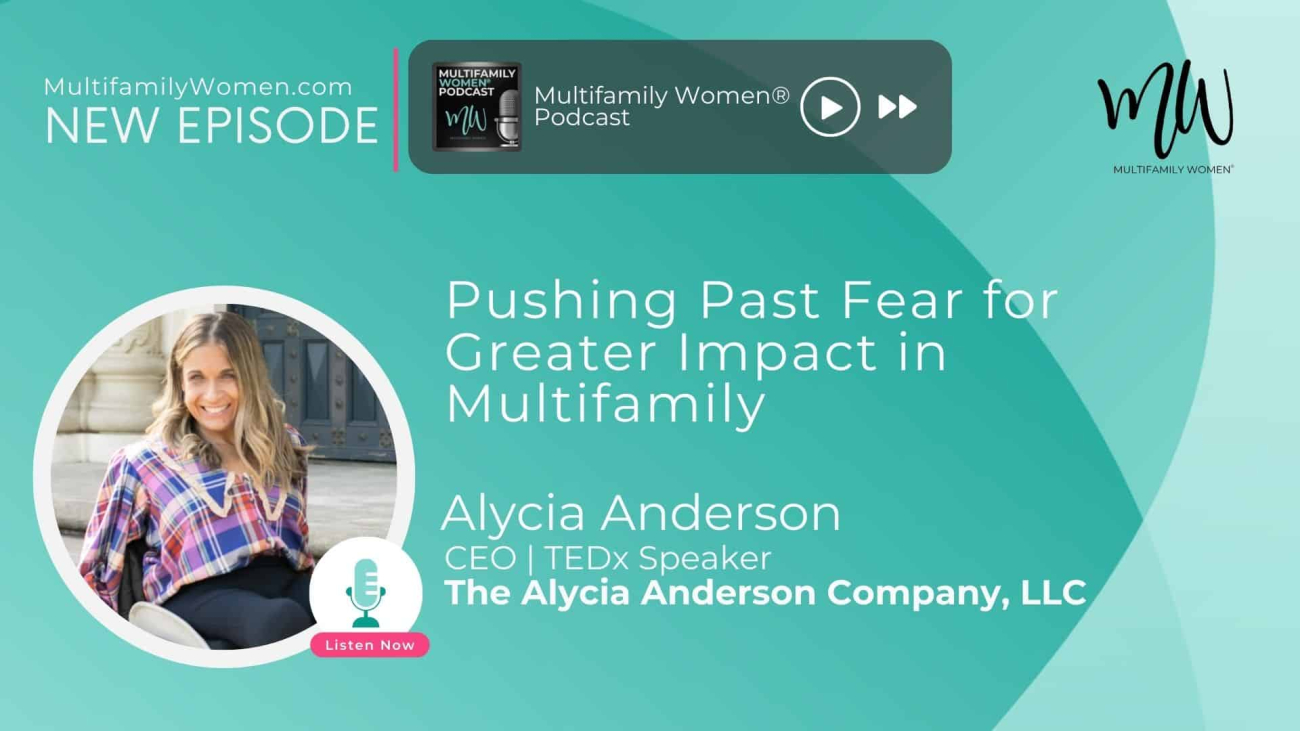On this episode of the Multifamily Women® Podcast, host Carrie Antrim interviews Alycia Anderson. Anderson created a company in her own name and has dedicated her life to creating a diverse and inclusive society and encouraging others to reach their fullest potential. She’s spoken on TEDx about overcoming ableism – an experience she describes as a dream come true.
Key Topics
(2:00) – Ted Talk
Anderson says this was a pivotal moment in her career. Her only options were to step up to the plate, or not.
“The content I shared and the direction I’m going in was a little bit intimidating for me, until I really became one with my disability,” said Anderson. She says she had to find the freedom to share without being afraid to do so, and finally reaching that point propelled her to many other opportunities.
“I nailed it,” said Anderson, to Antrim’s agreement. “I was really proud of myself.”
(5:15) – Tackling Uncomfortable Conversations
The only way to overcome stigmas, Anderson says, is to confront them.
Antrim says Anderson has served as a role model by approaching difficult conversations in a loving way that people can understand.
Anderson says she hasn’t always chosen to be a role model; it was kind of thrust upon her. She was born disabled in the 1970s, before there was much of a focus on inclusion, and she came to learn how necessary it is to be collaborative.
“Humanity is watching me,” explained Anderson. “Getting out of my car, going to corporate meetings – you name it, disability is something that we’re not necessarily super comfortable with looking straight on, communicating directly with the human being, having a conversation. It’s got so many layers of things you need to tackle that are kind of hard topics. We don’t want to offend each other, so we kind of just bypass it, ignore, look away.”
She says disabilities aren’t necessarily something to be fixed; they’re just who the person is.
(8:30) – Viewing Disability as Something to Give
Anderson says everyone could potentially become disabled. If that happens, it becomes part of your journey and can be something to learn from and be empowered by.
“My disability is the single most important part of my being, because it’s allowed me to look at life in a different way and be proficient at other things,” said Anderson.
Anderson says there’s beauty in the individuality disability can bring.
(10:10) – Changing Vocabulary
Antrim brings up that until recently, people didn’t even have the vocabulary to tackle conversations about disability. Now, it’s being brought into the workplace so people can more comfortably talk about it openly.
Anderson says the only way to learn is to make mistakes. Some people may vary in how they want to be addressed, but you won’t know that unless you broach the subject.
“A simple, ‘How are you, tell me about yourself,’ opens that conversation,” said Anderson.
(12:10) – Accessibility in Multifamily
Anderson tells a story of being escorted off of a multifamily property because they weren’t ADA compliant. She argues that if you look at ADA as an opportunity rather than something that’s a financial burden and delaying projects, everyone can benefit.
“Disability will affect one in four of us at some point in our lives – it’s the largest marginalized group,” said Anderson. “Moment in time – broken leg, forever like me, aging, it’s countless things.” She says you should look at accessibility at the forefront, developing things to help, rather than an afterthought.
Plenty of people choose to use Siri, ramps, larger bathrooms – things that were all initially created with accessibility in mind.
“There’s so much beautiful opportunity in shifting the conversation a little bit.”
(15:30) – Balance
Antrim believes that you can’t build a balanced society without someone on the team to remind you of that balance. Inclusion of marginalized groups is essential, she says, and she agrees it can certainly be an opportunity.
Anderson says it’s a huge relief to be able to have lighter conversations about disability; not everything has to be a lecture these days. Still, though, people are uncomfortable talking about their own disabilities, the things they’ve had to overcome, and the resources they can use to help themselves in day-to-day life.
“I’m trying to bring beauty and love and humanity because this takes a lot of work and a lot of seriously uncomfortable conversations – for both parties,” said Anderson.
She says those conversations tend to make a real difference and influence how people talk and think about inclusion.
(19:55) – Ableism
Anderson says most people are likely not familiar with the word.
“It’s a discrimination or social prejudice against people with disabilities, based on the belief that typical abilities are superior,” explained Anderson. “It’s everywhere in our society. It’s embedded in the way we think about society. It’s all of us, so we don’t even think about how it exists.”
She says people look at the disabled through a lens of pity, and figure disabled people are not capable of certain things. That’s a difficult thing to overcome – both for the people perpetuating the stigmas, and the people subjected to them.
Anderson admits she herself has been an ableist most of her life. She will sometimes say she’s okay when she isn’t. She regrets being afraid to ask for a work-around or even to initiate a conversation about it.
“It’s fluid, it’s ongoing, it never ends, it’s never going to look the same in each situation,” said Anderson. She can explain how to be inclusive in the workplace, but disabilities are as unique as a fingerprint and require flexibility.
(24:55) – Final Thoughts
Anderson says if you have a business and are having trouble talking about disabilities, please reach out to her.
“We have a huge, huge opportunity in multifamily,” said Anderson, “and we need to start hiring more people with disabilities. I’ve run into three that look like me in my entire time in multifamily. The more that we’re including people with disabilities in our industry, in the conversation, we’re bringing the expertise into each one of our organizations to learn to be just a little bit more nimble, a little bit more inclusive. This is something that’s an opportunity for all of us.”
Connect with Alycia
Website alyciaanderson.com
TEDx Talk “Disabling Ableism: The Modern Pathway to Inclusion”
LinkedIn @alyciaranderson
Instagram @alyciaspeaking

